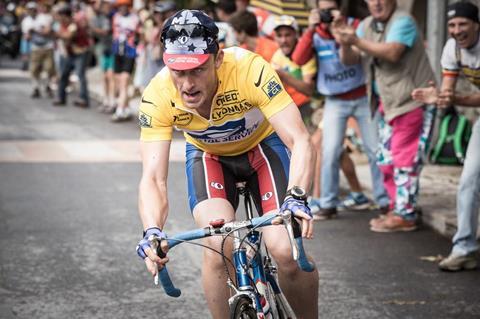Esteemed British filmmaker Stephen Frears gave Toronto audiences plenty to laugh about while in town supporting his upcoming film The Program.

Beginning with his masterclass held on Friday, he openly discussed the challenges of being a director, going so far as to question what he enjoyed about directing, if anything at all.
While most sat either in stunned silence or in fits of laughter, he continued by discussing the challenges in making the not-so-straight-forward Lance Armstrong heist thriller - not to be confused with a standard biopic, he vehemently pointed out.
“There is a lot of pressure to make a biopic but that has never interested me,” said Frears. “Lance had stolen seven Tour de France titles - what more could you ask for in terms of conflict?”
“The problem,” continued Frears, “is that I had no idea how to structure this film.”
Similar to other films he has worked on, he went into production without a solid approach, hoping ideas would come to him as the shoot progressed.
“Sometimes it happens like this. You are hurried into production because of financing or scheduling issues, and suddenly you’re in your own version of a ‘race’, and you’re not altogether sure what you want at that ‘stage’. I am much more comfortable with this impromptu way of working than other filmmakers, but still, this film did not come easy.”
He reflects on the arduous task of having to learn about the ins and outs of a sport he knew nothing about, relying heavily instead on ‘clever’ people around him such as former cyclist and drug cheat David Millar who helped with the cast’s regimented training schedule, Sunday Times sports journalist David Walsh whose book (Seven Deadly Sins: My Pursuit of Lance Armstrong) the film is based on and lead actor Ben Foster who just “got on with vigourously transforming himself into a professional cyclist.”
“I am not an auteur, I generally don’t have a ‘vision’,” quipped Frears. “I don’t pretend to have all the ideas. I can read scripts and know whether I can turn them into a film, and that’s about it.”
In a conversation with Film London’s Adrian Wootton at TIFF’s London House, Frears also professed to avoiding using storyboards.
“I just like to see what develops. I expect the DP to do their job, the actors to show up and do their job. That is what film is - it’s a collaborative effort. I don’t want to have to make all the decisions. And sometimes the best filmmaking happens organically, at least that is the case with me.
“You can also avoid boredom that way too,” chided Fears.
The prolific director, whose career spans from theatre to television and a roster of over 20 feature films - two of them Oscar-nominated for Best Director (The Queen and The Grifters) - reflected with Wootton on some of his previous successes, citing My Beautiful Laundrette and Dirty Pretty Things as some of his most authentic material to date.
“Immigration was a topic not many people were talking about at the time. It was very forward thinking. Audiences were actually rooting for the underdogs.”
He recalls working with producer Tim Bevan, of Working Title fame, for the first time (on My Beautiful Laundrette) - another example, he offers, where taking risks with young talent can be beneficial.
“Most of the time I don’t know what I am doing,” added Frears. “I rely on a lot of luck and instinct, and every once in a while it works.”
When asked what is next on his slate, following on from opera drama Florence Foster Jenkins starring Hugh Grant and Meryl Streep, he responded:
“I have no idea. I’ve been making films since the early ‘80s - you just want to keep going, and you’re astonished that you’re allowed to keep going. I know my family want to hurry and get me out of the house…
“If I keep my mouth open, then the fish swim through. It seems I have good intestines,” joked Frears.
He left audiences with a Billy Wilder quote: “‘A film director doesn’t have to be able to write but he does have to be able to read.’ So let’s see what lands in front of me.”







![The Brightest SunScreen[Courtesy HKIFF]](https://d1nslcd7m2225b.cloudfront.net/Pictures/274x183/3/5/0/1448350_thebrightestsunscreencourtesyhkiff_312678.jpg)

















No comments yet